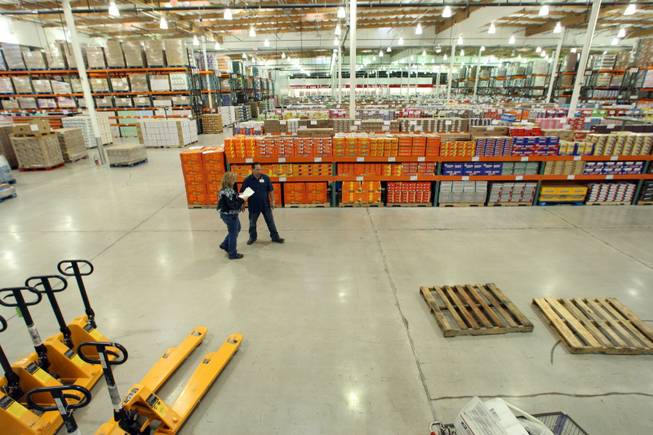
Marketing manager Bobby Alexander, right, talks with Kathy Darling inside the new Costco Business Center on Martin Luther King Boulevard on Feb. 11, 2009.
Tuesday, April 22, 2014 | 2 a.m.
Big discounts await shoppers at wholesale membership clubs like Sam's Club, BJ's and Costco, and shoppers swear by them to save money.
For small-business owners who need to buy in bulk, and for large families, paying a yearly membership fee can make sense, financial experts say. But others may want to think twice before signing up.
Membership fees at these buyers' clubs vary, but range from $45 to $55 annually, depending on the membership level. Membership lets people shop in the store to take advantage of the discounted products. This setup is what economists call a two-part tariff system; other models like this are gym memberships and book-of-the-month clubs, said Paul Mills, a marketing researcher who specializes in behavioral economics and pricing at Kent State University.
Darrin Duber-Smith, marketing professor at Metropolitan State University of Denver, who has analyzed retail and holiday shopping trends for years, said consumers usually cover the membership cost fairly quickly if they shop often.
"As long as you're careful with what you're buying, the membership fee is worth it," Duber-Smith said.
That's the key to making a membership work, experts said: avoiding impulse purchases and not overspending.
There are several ways to spend too much at these types of stores, they said. The first is buying too many perishable items.
"I think people buy too much," Duber-Smith said. "You end up trying to get the volume discount, but you end up throwing things away, particularly perishables. You know, milk, yogurt, that stuff."
Randy Allen, a professor at the Samuel Curtis Johnson Graduate School of Management at Cornell University, said big families can do well at these stores because they can leverage the bulk-size packaging even on items like fruits and vegetables.
Some grocers have begun packaging items such as meat in bulk as they try to lure back some shoppers. "A lot of supermarkets have moved to club packs where you can buy a whole group of chicken breasts and cut them apart and freeze them for later use," Allen said.
It's also beneficial for people who have large parties and already have a membership, she said.
Stocking up on nonperishables such as toilet paper or shampoo is a good way to make use of a membership, Allen said. But it's hard to compare prices between a buying club and a regular store because of the bundled quantities of the items. That can skew the per-unit cost.
"So the idea of being able to say I normally pay X for this, versus getting it in the supermarket, is a very difficult comparison unless you're really doing some strong research," she said.
Looking at the cheaper per-unit cost can lead to overbuying on nonperishables, Duber-Smith said, because shoppers focus on the volume.
"A lot of consumers don't realize they're tying up their cash flow. It's like business. Businesses don't like having too much inventory; families shouldn't have too much inventory either. When your cash flow is tied up, what happens? You can't spend money on other things," he said.
Having a few extra bottles of detergent might not seem like a big deal, but Duber-Smith said the average purchase in these stores is $300 to $500 a trip. That's a lot of money to spend at one time on goods a family might not use for a few months.
"For households on tight budgets, you don't want to tie up your cash flow. You may have to pay for ... visits to the emergency room or something like that and you don't have the money," he said.
Families on tight budgets should stick to other retailers, such as dollar stores, and not spend the money on a membership, he added.
Part of how the stores make money is on the memberships — which sometimes are refunded at the store's discretion, Allen said. Having a membership increases a person's store loyalty, Mills said, and can lead to overspending.
"Many customers spend more than they otherwise would because they pay the membership fee, (then) they are committed — sort of 'locked in' due to the expense of the membership and buy more than they really would normally want," Mills said.
Duber-Smith said the stores reach economies of scale by offering a limited number of products. "They tend to bulk buy from one or two major brands, rather than offering six or seven like grocery stores do," he said. "What you're not getting is selection, and I don't think people realize that."
Allen said the buying clubs can sometimes offer good values on big-ticket items that are available only once in a while, such as a high-quality area rug. Some of these stores also offer discounts on gasoline, she said, which can be a good deal.
Impulse shopping is difficult to avoid, said Mills, who advised buyers to go in with a list and stick with it. But that can be hard.
"They're really well designed for impulse purchases, so be really selective when you go in," Allen said. "You really need to tell yourself, is it something I need?"
Families of more than four people who shop smart can make the volume discounts work, Duber-Smith said.
"Fifty-five dollars a year (is) one dinner at Chili's. That's what we're talking about to make a yearlong commitment to my family to buying groceries, which is something we buy all the time. We're talking about spending thousands of dollars each year. Fifty-five dollars is not much in the grand scheme of things. Individuals should not shop at Costco," he said. "Families should."

Join the Discussion:
Check this out for a full explanation of our conversion to the LiveFyre commenting system and instructions on how to sign up for an account.
Full comments policy